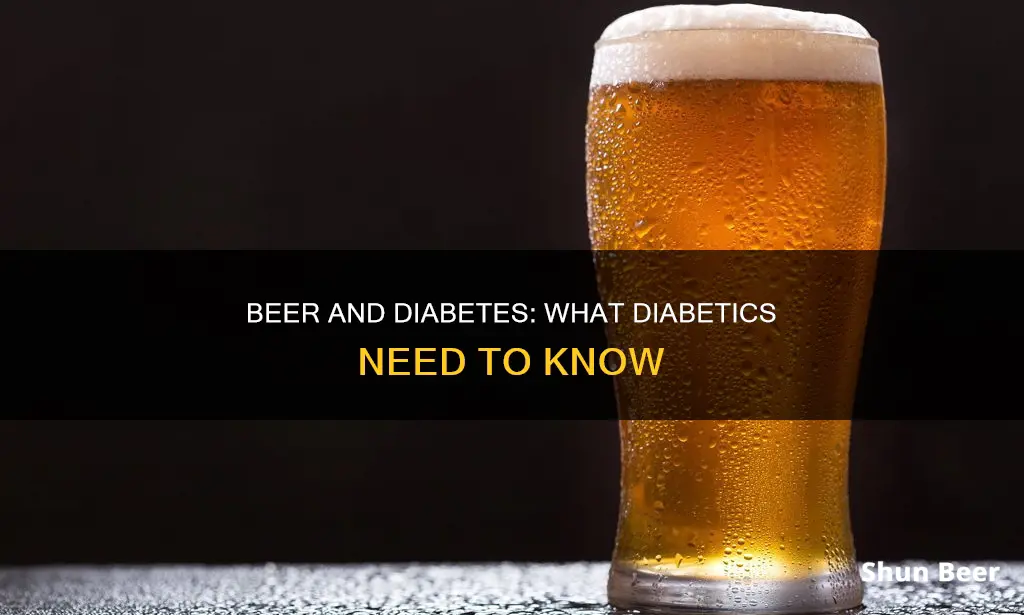
People with diabetes do not need to abstain from alcohol entirely, but they should be aware of how it can affect their body and how to manage this. Beer is a significant source of carbohydrates, so it can impact blood sugar levels. Beer can also be high in calories, which may contribute to weight gain over time. Additionally, drinking alcohol can slow down carb metabolism, potentially leading to low blood sugar (hypoglycemia). Therefore, it is essential for people with diabetes to be mindful of how many beers they consume and to ensure they are drinking in moderation.
What You'll Learn

Beer impacts blood sugar levels
Beer can impact blood sugar levels in people with diabetes. Beer is a significant source of carbohydrates, which can raise blood sugar levels. Alcohol also interferes with the liver's ability to release glucose, which can lead to low blood sugar (hypoglycemia). This effect can last for up to 24 hours after drinking.
The liver is responsible for releasing glucose into the bloodstream to maintain normal blood sugar levels. When alcohol is present in the body, the liver prioritizes breaking it down, which can delay the release of glucose. This can be dangerous for people with diabetes, especially if they are taking insulin or certain diabetes medications. The risk of hypoglycemia is higher when drinking on an empty stomach or when blood glucose levels are already low.
Beer and other alcoholic drinks can also be high in calories, which can contribute to weight gain and make it more difficult to manage diabetes. Additionally, alcohol can stimulate appetite and affect judgment, leading to overeating and poor food choices.
It is important for people with diabetes to be mindful of their alcohol consumption and how it can impact their blood sugar levels. Drinking in moderation, not drinking on an empty stomach, and monitoring blood sugar levels before, during, and after drinking are recommended ways to manage blood sugar levels while consuming beer.
Recommendations for Drinking Beer with Diabetes:
- Drink in moderation: Stick to no more than one drink per day for women and up to two drinks per day for men.
- Don't drink on an empty stomach: Have food or a carbohydrate-rich snack while drinking to maintain normal blood sugar levels.
- Monitor blood sugar levels: Check your blood glucose levels before, during, and after drinking, as well as up to 24 hours later.
- Be aware of symptoms: The symptoms of low blood sugar can be similar to those of alcohol intoxication, including dizziness, loss of consciousness, slurred speech, drowsiness, and confusion.
- Carry medical ID: Wear visible medical identification stating that you have diabetes, especially when drinking with others.
Beer Batters: How Do They Work?
You may want to see also

Alcohol can cause hypoglycaemia
The liver is responsible for releasing glucose into the blood and maintaining healthy blood sugar levels. However, when you consume alcohol, the liver prioritises breaking it down and eliminating it from the body, which interferes with its ability to release glucose. This can lead to a drop in blood sugar levels, especially if you drink on an empty stomach.
Drinking alcohol can increase the risk of hypoglycaemia for up to 24 hours after consumption. This risk is particularly high for people with diabetes who take insulin or medications that increase insulin production, as these can further lower blood sugar levels. Additionally, the symptoms of hypoglycaemia, such as slurred speech, drowsiness, and confusion, can be similar to those of intoxication, making it difficult to distinguish between the two conditions.
To prevent alcohol-induced hypoglycaemia, it is recommended to drink in moderation, eat before drinking, and monitor blood sugar levels closely. It is also important to be aware of the symptoms of hypoglycaemia and seek medical attention if necessary.
In summary, alcohol can cause hypoglycaemia by interfering with the liver's ability to release glucose and regulate blood sugar levels. This risk is heightened for people with diabetes and can lead to serious health complications. Therefore, it is crucial to drink responsibly and be mindful of blood sugar levels when consuming alcohol.
Tums to the Rescue: Beer Sickness Solution?
You may want to see also

Beer is high in calories
Beer contains as many calories gram for gram as a soft drink, so it can add a lot of calories to your diet. Studies have also shown that drinking alcohol can increase your appetite in the short term, causing you to eat more than you otherwise would. This means that drinking beer regularly could contribute a significant number of calories to your diet.
The prevailing opinion is that the darker the beer and the denser the head, the more calories it contains. However, this is not always the case. For example, beers like Peroni, Kronenbourg, Budweiser, Heineken, and Stella Artois deliver a significantly higher number of calories than Guinness due to their higher sugar content.
It's important to note that the number of calories in a pint of beer varies considerably between different types of beer. Some beers marketed as "light" may not necessarily be lower in calories. It's always best to check the exact number of calories contained in a beer, rather than assuming that it falls below that of other bottles without the word 'light' in their name.
Afib and Alcohol: Is Drinking Beer Safe?
You may want to see also

Beer is high in carbohydrates
Beer is typically higher in carbohydrates than other alcoholic drinks like wine or spirits. Beer is made from starch, a primary ingredient that is high in carbs. The number of carbs in beer varies depending on the type, with light beers containing the least amount of carbs, usually 5 grams or less per serving. Hoppy craft beers like IPAs and stouts tend to be much higher in carbs, with 15 grams or more per serving. Regular lagers tend to vary in carbohydrate content from about 10 to 15 grams per pint. Stouts, Porters, and Guinness are on the higher end of the carbohydrate spectrum and can have upwards of 20 grams of carbohydrates per pint.
The number of carbohydrates in beer can also depend on the serving size. A standard serving of beer is typically 12 ounces or 355 milliliters, but cans and bottles can sometimes be larger. For example, large 24-ounce cans are common at sports stadiums and would be considered two servings, not one. Additionally, beer cans and bottles do not always have nutrition facts labels, so it can be challenging to know the exact number of calories and carbs in a serving. However, nutrition information for some major beer brands can be found on websites like CalorieKing.com.
When it comes to diabetes, beer's high carbohydrate content can impact blood sugar levels. People with diabetes need to be mindful of their carbohydrate intake to manage their blood sugar effectively. Drinking beer can cause a rapid increase in blood sugar levels, which can be dangerous for people with diabetes. Additionally, the liver prioritizes clearing alcohol from the body, which can slow down carb metabolism and potentially lead to low blood sugar (hypoglycemia). Therefore, it is essential for people with diabetes to monitor their blood sugar levels and drink in moderation if they choose to consume beer.
Drinking Alcohol-Free Beer: Is It Safe to Drive in the UK?
You may want to see also

Alcohol can interfere with diabetes medication
Additionally, some diabetes medications, such as sulfonylureas and meglitinides, also lower blood glucose levels by stimulating the pancreas to produce more insulin. Combining these medications with alcohol can further increase the risk of hypoglycemia. It is important to note that drinking alcohol on an empty stomach can exacerbate this issue, as food slows down the rate at which alcohol is absorbed into the bloodstream.
Furthermore, alcohol can impair your liver's ability to produce glucose, making it crucial to test your blood sugar levels before consuming alcohol. Within a few minutes of drinking alcohol and for up to 12 hours afterward, alcohol can cause your blood glucose level to drop. Therefore, it is essential to monitor your blood sugar levels regularly while drinking and up to 24 hours after your last drink.
Lastly, alcohol can cloud your judgment, so you may not realize that your blood sugar is low. This is especially concerning as the symptoms of low blood sugar can be similar to those of alcohol intoxication, such as dizziness, confusion, and sleepiness. It is important to be mindful of these risks and take precautions, such as drinking in moderation, consuming alcohol with food, and regularly monitoring blood sugar levels, to ensure safe alcohol consumption while managing diabetes.
Liver Transplant and Alcohol: Is Drinking Beer Safe?
You may want to see also







